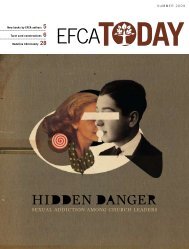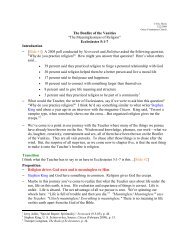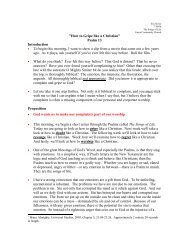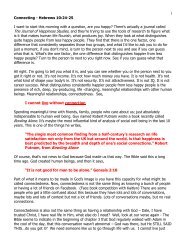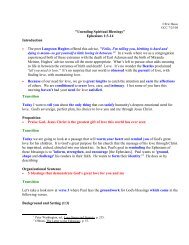The Bonfire of the Vanities âThe Satisfied Life, Part 2â Ecclesiastes 3 ...
The Bonfire of the Vanities âThe Satisfied Life, Part 2â Ecclesiastes 3 ...
The Bonfire of the Vanities âThe Satisfied Life, Part 2â Ecclesiastes 3 ...
You also want an ePaper? Increase the reach of your titles
YUMPU automatically turns print PDFs into web optimized ePapers that Google loves.
ecause <strong>the</strong>y heard he was ill. That is <strong>the</strong> kind <strong>of</strong> heart God is aiming to create throughdifficult circumstances: a deeply affectionate, caring heart for people. Don't waste yourdifficulties by retreating into yourself.– Number 7. [Slide #8] You will waste your difficult circumstances if you treat sin ascasually as before. God designs difficulties for <strong>the</strong> Christian in order to destroy <strong>the</strong> appetitefor sin. Pride, greed, lust, hatred, unforgiveness, impatience, laziness, procrastination, youname it—all <strong>of</strong> <strong>the</strong>se are your real enemies. Not your circumstances. Don't waste <strong>the</strong>opportunity to harness God’s power working through your circumstances to crush <strong>the</strong>se foes.– Number 8. [Slide #9] You will waste your difficult circumstances if you fail to use <strong>the</strong>difficulties <strong>of</strong> life as a means <strong>of</strong> witness to <strong>the</strong> truth and glory <strong>of</strong> Christ. Christians are neveranywhere by divine accident. <strong>The</strong>re are reasons for why we wind up where we do. Considerwhat Jesus said about painful, unplanned circumstances: <strong>The</strong>y will lay <strong>the</strong>ir hands on you andpersecute you, delivering you up to <strong>the</strong> synagogues and prisons, and you will be broughtbefore kings and governors for my name's sake. This will be your opportunity to bearwitness. 4 What happens, good or bad, is an opportunity to bear witness to Christ.– My prayer for you, Corey and Gretchen, and all <strong>of</strong> us this past week has been has been all <strong>of</strong><strong>the</strong>se things and especially <strong>the</strong> last; that more people will come to know Christ. God was andis and will always be in control, which is <strong>the</strong> whole point <strong>of</strong> <strong>the</strong> first half <strong>of</strong> <strong>the</strong> passage welooked at last week in <strong>Ecclesiastes</strong> 3.TransitionLet’s transition back to <strong>Ecclesiastes</strong> 3. Last week we looked at <strong>the</strong> first eight verses <strong>of</strong> chapter 3.<strong>The</strong>re is a time for everything, and a season for every activity under heaven. If you’ll remember,<strong>the</strong> purpose <strong>of</strong> this poem in summarizing <strong>the</strong> full spectrum <strong>of</strong> human experience, birth, death,war, peace, love, laughter, weeping, is to remind us that we have little or no control over whathappens. God sovereignly orders all <strong>of</strong> life. Even last week. He is in charge <strong>of</strong> <strong>the</strong> seasons, <strong>the</strong>times for all <strong>of</strong> us. Let’s pick up where we left <strong>of</strong>f. Look at verse 9. What does <strong>the</strong> worker gainfrom his toil? 10 I have seen <strong>the</strong> burden God has laid on men. 11 He has made everythingbeautiful in its time. He has also set eternity in <strong>the</strong> hearts <strong>of</strong> men; yet <strong>the</strong>y cannot fathom whatGod has done from beginning to end. 12 I know that <strong>the</strong>re is nothing better for men than to behappy and do good while <strong>the</strong>y live. 13 That everyone may eat and drink, and find satisfaction inall his toil--this is <strong>the</strong> gift <strong>of</strong> God. 14 I know that everything God does will endure forever;nothing can be added to it and nothing taken from it. God does it so that men will revere him. 15Whatever is has already been, and what will be has been before; and God will call <strong>the</strong> past toaccount. <strong>The</strong> second reason this life will never satisfy us apart from God is because you and Iwere made for eternity.Main Points– We are terribly conflicted creatures. Do you realize that? On <strong>the</strong> one hand, life is too big forus, verses 1-8. Things are way beyond our control like last week. <strong>The</strong>re’s birth and deathand war and losing and tearing and silence and peace and hating and building and tearingdown and embracing and scattering and weeping and killing. <strong>Life</strong> in this world is just toobig, too scary sometimes. That feeling <strong>of</strong> smallness, <strong>of</strong> feeling out <strong>of</strong> control, is meant to4 Luke 21:12–13
drive us to God. So on <strong>the</strong> one hand, things feel too big for us. We will never find <strong>the</strong>satisfied life until we find <strong>the</strong> God who is bigger than our circumstances. That’s verses 1-8.– But on <strong>the</strong> o<strong>the</strong>r hand, verses 9-15, this world is too small. Verse 11. God has set eternity in<strong>the</strong> hearts <strong>of</strong> men. Do you remember what that means? It means that God has put into allour hearts a capacity for eternal things…we have an innate sense <strong>of</strong> something whichtranscends our immediate situation. 5 <strong>The</strong> reason Qoheleth says this life will never satisfy usapart from God is because we were made for ano<strong>the</strong>r world; we were made for eternity. Weare frustrated by being placed in time, by being placed in circumstances beyond our controland understanding. We long for something more, we long for eternity even if we do notunderstand it. As Augustine said, “you have made us for yourself, and our hearts are restlessuntil <strong>the</strong>y can find peace in you.” 6– Because you were made for life beyond this world you will always be frustrated by this lifeunder <strong>the</strong> sun. 1 Corinthians 7:31. For this world in its present form is passing away. Thisworld and all that is in it will not last forever. But you will. You were made in <strong>the</strong> image <strong>of</strong>God. And like him, <strong>the</strong> Everlasting God, you will last forever. And because <strong>of</strong> that you willbe frustrated. However, just like <strong>the</strong> feeling <strong>of</strong> smallness that comes from events beyond ourcontrol, those frustrations and longings for something more beyond this world are meant todrive us to God. Look at verse 14. I know that everything God does will endure forever;nothing can be added to it and nothing taken from it. God does it so that men will revere him.– God has placed eternity in our hearts so that we might seek him out and find him. And whenwe come to him we find that he calls everyone everywhere to repent and turn from <strong>the</strong>ir sins<strong>of</strong> disbelief and lack <strong>of</strong> trust to believe in <strong>the</strong> one he sent—Jesus Christ.– We are made for something more. But you will never find what you’re looking for until yourealize what’s been lost and what’s been done about it. As Michael Eaton says, “An eternallife has been lost. An eternal covenant has been initiated by an eternal God. An eternalpriesthood and an eternal kingdom have been conferred by a God eternally merciful, givinghis people eternal joy.” 7– We need not understand everything in life. We just need Christ. God has purposed to uniteall things in [Christ], things in heaven and things on earth. 8 <strong>Life</strong> will be satisfying to us, ifand only if, we are first satisfied to find our meaning in God. And God has chosen to directand funnel all questers, all who come to him, to Jesus. It’s through Christ that life reallybegins to take on meaning and significance and purpose which is why Jesus says <strong>of</strong> himself,I have come that <strong>the</strong>y may have life, and have it to <strong>the</strong> full. 9Conclusion– I think that Qoheleth, in all his searching, in all his questing, anticipates what God is going todo in Christ. He knows this life is bogus. He knows <strong>the</strong>re’s something more. So here’s <strong>the</strong>deal. Qoheleth has pointed you in <strong>the</strong> direction <strong>of</strong> God. Good. You realize you need him in5 Eaton, p. 81.6 Eaton, p. 81.7 Eaton, p. 81.8 Ephesians 1:109 John 10:10
Marinaro. Ingresso ore 20.00,inizio ore 20.30.Foggia, teatro comunale «UmbertoGiordano»: dal 12 al 14aprile rappresentazione dellacommedia / giganti della montagnadi Luigi Pirandello con MarioRigillo e Anna Teresa Rossini,regia di Maurizio Panici. Portaore 20.30, sipario ore 21.00.Mercoledì 24 aprile a Lucerapresso la sala concerti «Paisiello»,concerto del trio Johannescon Francesco Manara, primoviolino della Scala; Massimo Po-Udori primo violoncello della Scalae Claudio Vogherà al pian<strong>of</strong>orte.L'acquaSPRECARLA// pozzo misterioso della masseria Mortella.ni nostri». «Dopo la caduta di SanGiovanni d'Acri (1291), continua ilRelatore, alcuni Cavalieri Templarisi rifugiarono in alcuni conventi napoletanie fino alla loro messa albando (1307-14) iniziarono all'esoterismoalcuni adepti inculcandoloro la concezione tipica delle settereligiose, secondo le quali la «verità»viene rivelata soltanto ad alcunieletti». Sicuramente i Templariappresero queste concezioni dagliArabi e le propagarono segretamentead alcuni iniziati che a lorovolta le trasmisero ad altri». Il deSangro si recava spesso nel suopaese natale per interrogare i contadinidel suo feudo sulle virtù dialcune piante <strong>of</strong>ficinali da sottoporrepoi ad esperimenti».Dal canto suo, il Pr<strong>of</strong>essore Hebeltraccia un quadro nitido dell'esoterismodi don Raimondo desumendolodal libro del contemporaneoOrtiglia, da alcuni documenti dellaBiblioteca Vaticana, dalla «LetteraApologetica» scritta dal de Sangroper giustificare la sua appartenenzaalla Massoneria e sulle concezioniesoteriche dei Rosa-Croce basate suAlchimia.Cabala e Magia.Parlando di alcune invenzioni delde Sangro il relatore si s<strong>of</strong>fermadro intonacato pr<strong>of</strong>ondo quattrometri con tre di diametro. Non è unpozzo perché è senza macera per lapercolazione dell'acqua; non è unafossa granaria perché troppo scavatain pr<strong>of</strong>ondità; non è una cisternaperché il suo fondo è costituito daciottoli comunicanti con un cunicoloriempito di ciottoli di fiume.Si tratta di una costruzione interratache attualmente non serve anulla ma che in passato è servitaallo scopo per la quale è stata costruita.A rigore di logica e secondo«scienza e coscienza» si potrebbeipotizzare che, in considerazioneche sul fondo della costruzione, dauna parete all'altra diametralmenteopposte, si erge un'arcata alta piùdi un metro e larga poco menocapace di contenere una bara sullasua superficie: ...II Duca Vincenzode Sangro, figlio di don Raimondo,nascose le spoglie del suo illustreGenitore morto in odore di stregoneriadentro una specie di tombacostruita ad hoc presso una dellesue tante masserie.Sarà questa solo una ipotesi?Agli Archeologi l'ardua sentenza.Severino CarlucciAli Babà»), segnalando ai lettoril'importanza di questa secolare tradizione(«Ho visto cose antiche,nessuna m'è sembrata più antica diquesta» [...] «Nessun luogo avrebbepiù diritto d'essere dichiaratoMonumento Nazionale»).Il 15 maggio Ungaretti visitaLucera, accompagnato da GiambattistaGifuni, Direttore della bibliotecacomunale, e resta impressionatodalle pietre e dai monumenticarichi di storia, in particolare dalduomo («è un'elegante mole con unnonnulla di calligrafico, pericolosae anche serena, come s'addice aUn viaggio nel passatoal montagnoso Gargano, per poi approdarenuovamente nella distesasconfinata del Tavoliere. Qui Ungarettisaluta con un ideale abbracciola Capitanata, illuminato dalcaldo sole estivo: «Mi commuoverebbealtrimenti così a fondo, unsole reso gentile? Voglio dire cheanche qui ha regno il sole autentico,il sole belva. [...] La pianuras'apre come un mare. Vorrei quivederlo nel suo sfogo immenso,ondeggiare coll'alito tormentoso delfavonio sopra il grano impazzito. Èil mio sole, creatore di solitudine»...Stefano CaponeRacconti della nostra terraEstato da poco pubblicato dalleEdizioni del Poggio (di PoggioImperiale), a cura di G. Saitto, un librodi racconti ambientati tutti nellanostra terra dauna, da Apricena a SanSevero e Torremaggiore, da Vieste aBovino e Volturino, da San Marco inLamis a Castelnuovo e Chieuti daDeliceto a Troia e Serracapriola, daLucera a Volturara e Poggio Imperiale,da Rodi a Peschici e Rignano, tutte«storie brevi ritrovate nella memoria,da tramandare alle nuove generazioni,perché nulla vada perduto», conparticolari riferimenti a «tradizioni eusanze che vanno man mano scomparendodalla nostra realtà quotidiana;e tale quotidianità, scrìve l'Autricenella premessa, che qui emergefacendo un percorso a ritroso nel temp<strong>of</strong>ra uomini e donne che fanno partedella nostra vita presente e passata,pur se può sembrare un insieme dieventi senza alcun significato ideale,si inserisce in un mondo culturale dicui è valida espressione».Un vero e proprio viaggio nel passato«per riscoprire e assaporare cal-(je atmosfere e dolci pr<strong>of</strong>umi», comescrive A. Zincanti nel presentare laedizioni; scolastica del libro, munitodelle relative schede didattiche e delleillustrazioni di Gloria Gravina. Illibro, in buona veste tipografica, fornisceuna lettura avvincente e interessanteper giovani e meno giovani,e si avvale della presentazione delPr<strong>of</strong>. Joseph 'Fusioni, poeta e scrittoreitalo americano, che più di ognialtro ha portato in cuore i ricordi delpassato, rimanendone fortemente legatoe custodendoli come tesori.Memore di quanto fu amaro il calicedella emigrazione, della lontananza edel sacrificio negli anni della primametà del Novecento, egli scrive cherimane nel lettore «un sottilissimovelo di tristezza che magicamente sitrasforma in protagonista», quando siscorrono le pagine del libro, fatto «diun mondo ordinario di povera gente,di banditori, di calessini, di soprannomi,di usanze funebri, di puteolenticurri notturni di ladruncoli affamati,di compari avvinazzati e di brigantiche seminano il terrore». Racconti chein definitiva «costituiscono un preziosocontributo alla conoscenza o allariscoperta di usi e costumi, valori evoci della nostra civiltà meridionale.E tutto questo ce lo aspettavamo dauna appassionata cultrice di antropologiaquale è Silvana del Carretto».G.G.



